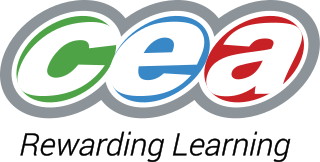The General Certificate of Secondary Education (GCSE) is an academic qualification in a range of subjects taken in England, Wales, and Northern Ireland, having been introduced in September 1986 and its first exams taken in 1988. Public schools in Scotland use the Scottish Qualifications Certificate instead. However, private schools in Scotland often choose to follow the English GCSE system.
The Advanced Extension Awards are a type of school-leaving qualification in England, Wales and Northern Ireland, usually taken in the final year of schooling, and designed to allow students to "demonstrate their knowledge, understanding and skills to the full". Currently, it is only available for Mathematics and offered by the exam board Edexcel.

The Council for the Curriculum, Examinations & Assessment (CCEA) is an awarding body in Northern Ireland. It develops and delivers qualifications, including GCSEs, AS, and A Levels, and provides curriculum support and assessments for schools. CCEA is a non-departmental public body and regulator, approving and monitoring Awarding Organisations offering qualifications in Northern Ireland.

The International General Certificate of Secondary Education (IGCSE) is an English language based secondary qualification similar to the GCSE and is recognised in the United Kingdom as being equivalent to the GCSE for the purposes of recognising prior attainment. It was developed by Cambridge Assessment International Education. The examination boards Edexcel, Learning Resource Network (LRN), and Oxford AQA also offer their own versions of International GCSEs. Students normally begin studying the syllabus at the beginning of Year 10 and take the test at the end of Year 11. However, in some international schools, students can begin studying the syllabus at the beginning of Year 9 and take the test at the end of Year 10.
Dominican College a Catholic grammar all-girls school in Fortwilliam Park, north Belfast, Northern Ireland.

Priory Integrated College or more commonly known as Priory College or simply Priory is a secondary school located on My Lady's Mile, in Holywood, County Down, Northern Ireland.

Victoria College, Belfast is a voluntary non-denominational independent grammar school in Cranmore Park, Belfast, Northern Ireland. In 2022, the college's stated enrolment was 870.

The A-level is a subject-based qualification conferred as part of the General Certificate of Education, as well as a school leaving qualification offered by the educational bodies in the United Kingdom and the educational authorities of British Crown dependencies to students completing secondary or pre-university education. They were introduced in England and Wales in 1951 to replace the Higher School Certificate. The A-level permits students to have potential access to a chosen university they applied to with UCAS points. They could be accepted into it should they meet the requirements of the university.

Lumen Christi College is a co-educational Catholic grammar school in Bishop Street, Derry, Northern Ireland. The school was founded in September 1997 and is located at the site of the old St Columb's College.

Our Lady and St Patrick's College, Knock, known locally as Knock or OLSPCK, is a Catholic diocesan grammar school in Knock in the east of Belfast in Northern Ireland. The school, with an expanding enrolment, announced in late 2019 it anticipated future enrolment of 1,330.
Examination boards in the United Kingdom are the examination boards responsible for setting and awarding secondary education level qualifications, such as GCSEs, Standard Grades, A Levels, Highers and vocational qualifications, to students in the United Kingdom.
The A-level is a main school leaving qualification of the General Certificate of Education in England, Wales, Northern Ireland, the Channel Islands and the Isle of Man. It is available as an alternative qualification in other countries, where it is similarly known as an A-Level.

St Louis Grammar School, Kilkeel is a Roman Catholic secondary school located in Kilkeel, County Down, Northern Ireland. It is a co-educational school for pupils aged 11 to 18, with about 700 pupils enrolled.
The Entry Level Certificate (ELC) is a qualification offered in England, Wales and Northern Ireland. It lies at Entry Level of the National Qualifications Framework, pitching it just below GCSE level.

Loreto College is a Roman Catholic grammar school situated in the Castlerock Road area of Coleraine, County Londonderry, on the north coast of Northern Ireland. Loreto College educates both girls and boys between the age of 11 and 18.
Additional Mathematics is a qualification in mathematics, commonly taken by students in high-school. It features a range of problems set out in a different format and wider content to the standard Mathematics at the same level.
St Louis Grammar School is a school in Ballymena, Northern Ireland.
Assumption Grammar School is a Catholic girls' grammar school in Ballynahinch, County Down, Northern Ireland, with over 900 students.
Cross & Passion College, Ballycastle is a co-educational secondary school in Ballycastle, County Antrim, Northern Ireland. The school has an enrollment of over 750 pupils and retains over 50 members on staff. The facility includes about 45 classrooms, a cafeteria, a sports hall, a gym and an assembly hall. It also has a handball area, tennis courts, a gravel pitch and a grass pitch.
St. Joseph's Grammar School is a voluntary grammar school for students in Donaghmore, County Tyrone, Northern Ireland. The teaching age range is 11–18. The school provides the option of sixth form after pupils finish year 12.










